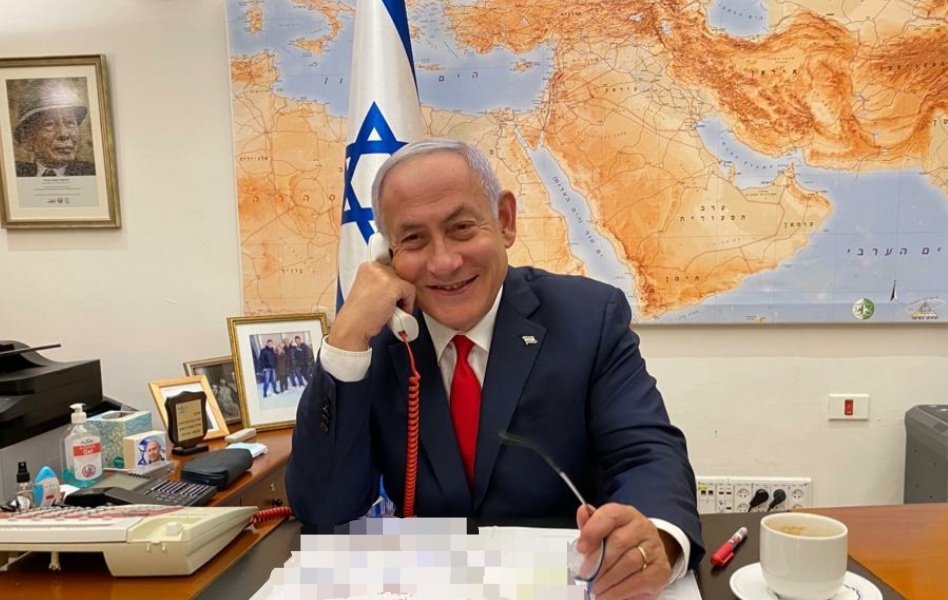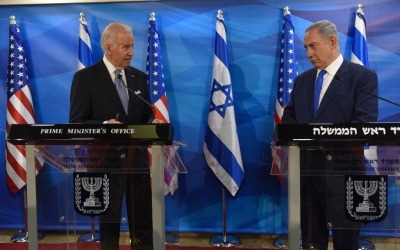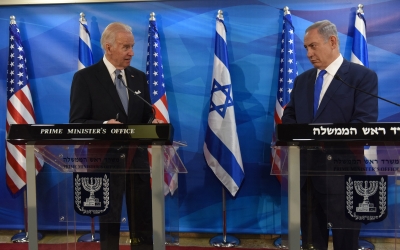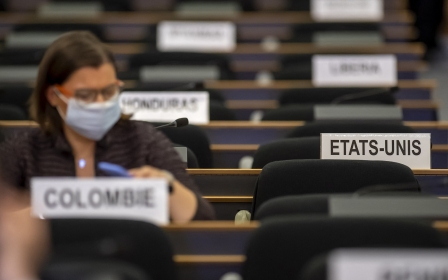Biden makes long-awaited call to Israel's Netanyahu

US President Joe Biden made a much-anticipated call to Israeli Prime Minister Benjamin Netanyahu on Wednesday, nearly one month into his presidency, ending a prolonged silence that led to speculation regarding the message the White House may have been trying to send.
The Israeli prime minister's office said in a statement that the two had a "very friendly and warm" conversation about US-Israel relations, which lasted about an hour.
"The two leaders noted their long-standing personal ties and said they would work together to further strengthen the strong relations between Israel and the United States," the statement said.
Netanyahu's Twitter account noted the conversation also touched on the continuation of normalisation deals, Iran, and regional security challenges.
Biden also commended Netanyahu on "his leadership in the fight against the coronavirus" and the two exchanged ideas on ways to deal with the pandemic, according to the Twitter post.
The White House released a statement later on Wednesday, saying that the president "affirmed his personal history of steadfast commitment to Israel's security and conveyed his intent to strengthen all aspects of the U.S.-Israel partnership, including our strong defense cooperation".
Biden also emphasised US support for the recent normalisation deals between several Arab countries and Israel.
"The president emphasised US support for the recent normalisation of relations between Israel and countries in the Arab and Muslim world," a White House statement said.
"He underscored the importance of working to advance peace throughout the region, including between Israelis and Palestinians. Together, they affirmed their shared interest in continued strategic cooperation to confront the many challenges facing the region."
When asked about the call in person, President Biden told reporters that the pair had a "good conversation", without providing further details.
Pushing off the call?
The time in which it took President Biden, sworn in on 20 January, to reach out to his Israeli counterpart stirred controversy in recent weeks, as US presidents have generally contacted the Israeli prime minister's office within the first few days of their presidency.
White House Press Secretary Jen Psaki addressed the issue during several recent news briefings, stressing the two leaders' "long-standing relationship".
On Tuesday, Psaki told reporters that the call would happen soon.
"Israel is of course an ally. Israel is a country where we have an important strategic security relationship, and our team is fully engaged, not at the head of state level quite yet but very soon," Psaki said at the time.
Still, the wait led many to speculate whether Biden sought to send a message to the Israeli leader, who grew incredibly close to former President Donald Trump.
Danny Danon, a former Israeli ambassador to the UN, brought the controversy to the fore last week when he posted a bizarre tweet that highlighted Biden's outreach to other foreign leaders, despite his apparent snubbing of the Israeli PM.
Biden spoke to at least a dozen world leaders during his first month in office, though his call to Prime Minister Netanyahu on Wednesday was the first call to a head of state in the Middle East.
Biden's past with Netanyahu
Still, Ben Rhodes, Obama's deputy national security adviser for strategic communications, said Biden's reluctance to contact Netanyahu should not come as a shock, given the prime minister's treatment of Biden's former administration.
"What a surprise that after Bibi spent years relentlessly undermining the Obama-Biden Administration he's not at the top of the call list," Rhodes said in a tweet last week, using a nickname for the Israeli PM.
In 2015, Netanyahu tested the US-Israel relationship when he spoke to a joint session of Congress without notifying the White House, and urged lawmakers to undermine Obama's efforts to strike a nuclear deal with Iran.
At the time, his address stirred up controversy and threatened to turn support for Israel into a partisan issue, as Democrats were very much against the move, which was seen as a stunt that challenged Obama's presidential authority over foreign policy.
Despite Israeli objections, Biden has vowed to attempt to re-enter the nuclear deal with Iran after then-president Trump, who cultivated an exceptionally strong relationship with Netanyahu, pulled out of the deal in 2018.
Still, Biden's reluctance to call the Israeli leader is hardly proof of any kind of rejection of Israel's status as one of Washington's most valued allies.
Since taking office, President Biden, a strong supporter of Israel throughout his long political career, has made clear that the US has no intention of reversing controversial Trump-era policy changes, including US recognition of Jerusalem as the capital of Israel.
Biden has also promised to keep the US embassy to Israel in Jerusalem, turning down progressive calls to move the diplomatic post back to Tel Aviv, where world bodies have historically placed embassies due to the contested nature of Jerusalem's status.
The US president has also pledged never to impose conditions on US military assistance, despite calls from progressive Democrats to do so.
Middle East Eye propose une couverture et une analyse indépendantes et incomparables du Moyen-Orient, de l’Afrique du Nord et d’autres régions du monde. Pour en savoir plus sur la reprise de ce contenu et les frais qui s’appliquent, veuillez remplir ce formulaire [en anglais]. Pour en savoir plus sur MEE, cliquez ici [en anglais].







